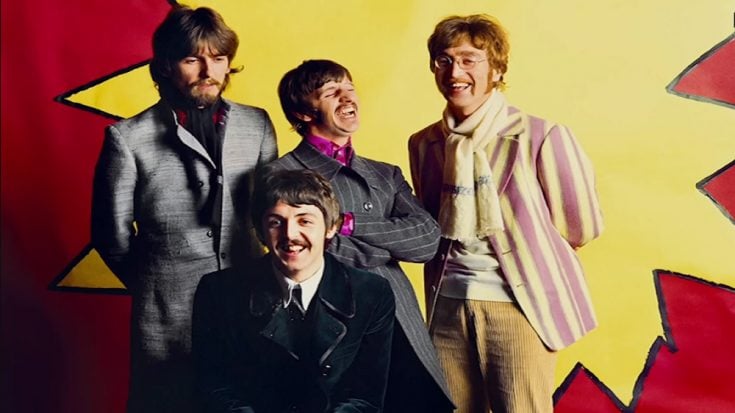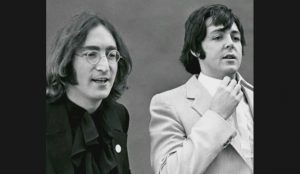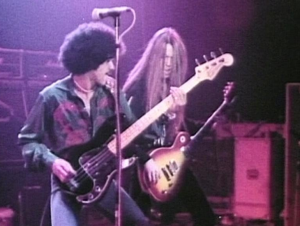The 10 Times The Grammys Picked Wrong

via Music Box USA / YouTube
The Grammys have been a lightning rod for criticism since their inception, and with good reason. While some argue about the lack of awards for iconic artists like Queen and Jimi Hendrix, it’s the year-to-year blunders that truly highlight the questionable nature of the awards.
Choosing the most egregious oversights wasn’t easy, but after sifting through countless head-scratching moments, we’ve compiled a list of the 10 Times the Grammys Got It Wrong.
The Academy’s rocky relationship with rock music goes back to the beginning. While legends like Chuck Berry and Elvis Presley were shaping the genre, the Grammys seemed oblivious. This disregard continued even as The Beatles revolutionized pop culture, with the Academy inexplicably awarding a major prize to a Broadway musical instead.
This pattern of overlooking deserving artists persisted for decades. The Beach Boys, Jefferson Airplane, The Eagles, Pink Floyd – all felt the sting of Grammy voters’ questionable choices. And who can forget Metallica’s infamous loss to Jethro Tull in the first-ever metal category? While the Grammys have undoubtedly gotten it right at times, their history of baffling decisions seems to overshadow even their most well-deserved awards.
1965 – Mary Poppins overshadowed the Beatles
1965 was supposed to be a victory lap for the Beatles at the Grammys. Beatlemania was in full swing, and their 1964 film A Hard Day’s Night and its accompanying soundtrack were both critically acclaimed and commercially successful. The film’s music, capturing the band’s youthful energy and innovative sound, seemed destined to win the coveted Best Original Score Written for a Motion Picture or Television Show award.
However, in a decision that left many bewildered, the Grammy went not to the Fab Four, but to the family-friendly tunes of “Mary Poppins”. This unexpected outcome fueled speculation that Grammy voters, possibly harboring lingering prejudice against rock and roll, failed to recognize the artistic merit and cultural impact of the Beatles’ work.
This controversial snub marked a turning point in the Recording Academy’s relationship with rock music. While the Beatles eventually received numerous Grammys throughout their career, the 1965 upset became a symbol of the Academy’s occasional disconnect with the evolving musical landscape and its tendency to overlook groundbreaking artists in favor of more established or traditional forms of music.
1965 – The Beatles’ troubles weren’t so far away as “Yesterday” lost as well
The year 1965 marked a perplexing moment in Grammy history: They seem to hate the mop-headed boys from Liverpool. Despite the undeniable cultural impact of the Beatles, the Recording Academy seemed determined to overlook their contributions. This was evident not only in the snub of their film score but also in the baffling decision regarding “Yesterday” for Song of the Year.
While the band’s earlier music might have challenged some voters’ sensibilities, “Yesterday” offered a poignant ballad that transcended genre limitations. Its universal themes of longing and loss resonated deeply with audiences worldwide, eventually becoming one of the most covered songs of all time.
However, Grammy voters opted for “The Shadow of Your Smile”, the saccharine theme song from a forgettable film. This choice left many scratching their heads and fueled accusations of bias against rock music. The stark contrast between the enduring legacy of “Yesterday” and the obscurity of the winning song highlighted the potential disconnect between award ceremonies and the true impact of music on culture and history.
1967 – The Beatles (again) and The Beach Boys lost the Best Rock & Roll Recording award to a forgettable pop song
1967 was a pivotal year for rock music, witnessing the release of groundbreaking albums like The Beatles’ Sgt. Pepper’s Lonely Hearts Club Band and The Beach Boys’ Pet Sounds. However, the Grammys, determined to keep their disrespect of rock music, delivered a head-scratching decision in the Best Rock & Roll Recording category.
This category, a category seemingly designed to grudgingly acknowledge the genre’s growing influence, was ironically won by a record that sent pop music back in time. Nominees included iconic tracks like the Beach Boys’ revolutionary “Good Vibrations”, the Beatles’ introspective “Eleanor Rigby”, and the Mamas & the Papas’ infectious “Monday, Monday”.
However, the award went to The New Vaudeville Band’s “Winchester Cathedral”, a novelty song reminiscent of the 1930s and obviously not rock and roll. This unexpected choice sparked confusion and disappointment, raising questions about the Recording Academy’s understanding of contemporary music and their criteria for recognizing artistic merit within the genre.
1968 – The Grammys picked a Best New Artist that was never heard from again some years later
The 1968 Grammys saw another questionable decision in the Best New Artist category. While Bobbie Gentry’s “Ode to Billie Joe” remains a captivating song with impactful storytelling, her career trajectory did not match the award’s intended recognition. Despite reaching number one, Gentry’s debut album lacked the consistency and long-term potential of other nominees.
In contrast, Jefferson Airplane stood as a strong contender, representing the burgeoning psychedelic rock scene with their innovative sounds and socially conscious lyrics. Their music resonated deeply with the counterculture movement and left a lasting mark on musical history.
The decision to award Gentry over Jefferson Airplane raised concerns about the Grammy’s ability to identify truly impactful and enduring artists. While “Ode to Billie Joe” undeniably holds its own place in music history, Jefferson Airplane’s influence and legacy far surpassed the immediate success of Gentry’s single.
1978 – “Hotel California”, one of the greatest songs ever made, somehow lost to two sappy songs
The 1978 Grammys witnessed a historical, yet baffling, moment in the Song of the Year category. Instead of recognizing a single winner, the award ended in a tie, leaving music fans scratching their heads. However, the real travesty was not the shared victory, but the two songs that emerged triumphant.
Debby Boone’s “You Light Up My Life” and Barbra Streisand’s “Evergreen” may have garnered popularity at the time, but their sentimental ballads lacked the enduring impact and artistic merit of the other nominees. Both paled in comparison to the undeniable masterpiece that was “Hotel California” by the Eagles.
This iconic track, with its intricate storytelling, layered instrumentation, and hauntingly beautiful melodies, transcended the boundaries of popular music. “Hotel California” became a cultural touchstone, resonating with listeners for generations and securing its place among the greatest songs ever written.
1979 – Elvis Costello and The Cars lost to a one-hit-wonder disco group
The year 1979 saw the undeniable influence of disco music reflected in the Grammy nominations. While the genre’s popularity was undeniable, the Recording Academy’s choices left many questioning their commitment to recognizing long-term artistic merit.
The most glaring oversight came in the Best New Artist category. A Taste of Honey, a Los Angeles studio group known primarily for their one-hit wonder “Boogie Oogie Oogie”, surprisingly took home the award. While the song remains a catchy example of disco music, their limited musical output and lack of lasting impact paled in comparison to the other nominees.
Elvis Costello, a rising star known for his innovative songwriting and punk-influenced sound, and The Cars, who would go on to become one of the most influential new wave bands, were both overlooked in favor of A Taste of Honey’s fleeting success. The Grammys’ choice left many wondering if they were truly recognizing the artists who would shape the future of music.
https://twitter.com/Indifference34/status/1756075809347944700
1981 – Pink Floyd’s era-defining masterpiece failed to triumph over a soft rock debut album
The 1981 Grammys presented a stark contrast between established artists and emerging giants. Familiar names like Billy Joel, Frank Sinatra, and Barbra Streisand graced the Album of the Year category, alongside a true game-changer: Pink Floyd’s monumental The Wall.
However, the Grammy for Album of the Year went not to the groundbreaking Pink Floyd masterpiece, but to Christopher Cross’ self-titled debut album. While commercially successful, Cross’ pop-rock offerings paled in comparison to the artistic weight and lasting influence of The Wall.
The progressive magnum opus transcended the boundaries of rock music, becoming a cultural phenomenon that continues to resonate with audiences decades later. The Grammys’ decision to overlook such a significant work raised questions about their ability to recognize and celebrate music’s true artistic merit and cultural impact.
1985 – The landmark albums Born in the U.S.A. and Purple Rain lost to Lionel Richie
The year 1984 was a banner year for music, with iconic albums like Bruce Springsteen’s Born in the U.S.A., Prince’s Purple Rain, and Cyndi Lauper’s She’s So Unusual dominating the charts and leaving a lasting impact on pop culture. These albums, now considered classics of the 1980s, were all nominated for Album of the Year at the 1985 Grammys.
But, of course, the Recording Academy awarded the prestigious honor to Lionel Richie’s Can’t Slow Down. While undoubtedly a strong album and arguably Richie’s best work, it lacked the cultural significance and enduring legacy of its nominated competitors.
Born in the U.S.A. and Purple Rain were not just commercially successful, they were cultural icons that redefined the sound of a generation. Lauper’s album, with its infectious energy and diverse musical influences, broke boundaries and paved the way for a new wave of female artists. This choice highlighted a recurring theme in Grammy history: a tendency towards playing it safe and favoring established artists over groundbreaking and innovative works.
1989 – That time when Jethro Tull won Best Hard Rock Performance vs Metallica
The year 1989 witnessed one of the most infamous and controversial moments in Grammy history. The newly established Best Hard Rock/Metal Performance category, intended to recognize the burgeoning genre, saw a clash of titans. Metallica, fresh off the monumental success of …And Justice for All, stood as a clear frontrunner.
However, in a decision that sent shockwaves through the music world, the Grammy went not to the metal giants, but to Jethro Tull for their album Crest of a Knave. While Jethro Tull undoubtedly possessed a rich musical legacy, their inclusion in the hard rock/metal category felt like a glaring misjudgment. Their sound, characterized by progressive rock elements and flute solos, stood in stark contrast to the heavy riffs and driving rhythms defining the metal genre.
This choice sparked widespread criticism and accusations of the Recording Academy being out of touch with the evolving musical landscape. …And Justice for All, with its enduring influence on the genre and lasting impact on countless musicians, was widely considered the more deserving contender. The Jethro Tull win became a symbol of the Grammys’ occasional disconnect with the true spirit of various genres.
https://twitter.com/jegentry66/status/1352649213037916160
1993 – An acoustic “Layla” strangely won Best Rock Song over the iconic “Smells Like Teen Spirit”
The 1993 Grammy Awards witnessed another controversial decision, this time in the Best Rock Song category. While Eric Clapton’s acoustic rendition of “Layla” from his Unplugged album emerged victorious, many argued that the award overlooked a far more significant and impactful song.
Nirvana’s “Smells Like Teen Spirit” had become an anthem for a generation, defining the grunge movement and revitalizing rock music in the early 1990s. Its raw energy, angst-ridden lyrics, and innovative blend of punk and alternative rock elements resonated deeply with audiences worldwide, leaving an undeniable mark on musical history.
Clapton’s acoustic version of Layla, while undoubtedly a respectable interpretation of the classic rock song, lacked the same cultural impact and groundbreaking spirit as Nirvana’s original. The Grammys’ decision to favor a reinterpretation of an established song over a genre-defining anthem is just one of the many glaring mistakes they made in the many years of its existence.











